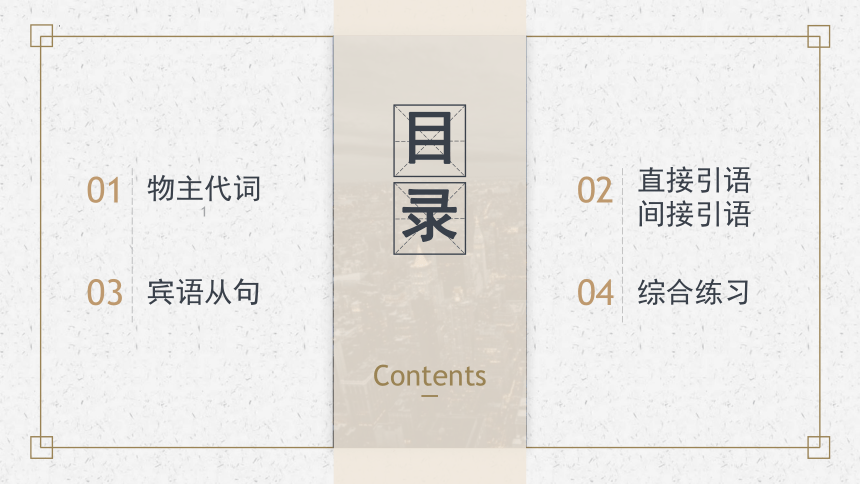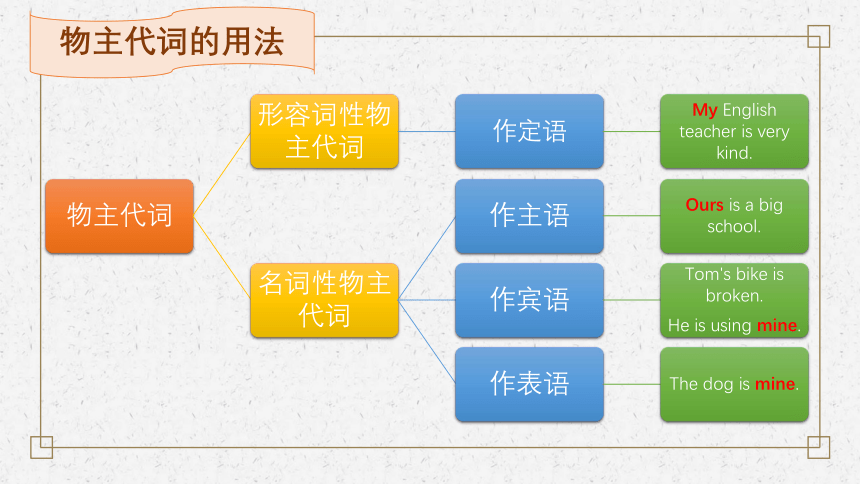2024年中考英语语法复习课件(物主代词及宾语从句)(共29张PPT)
文档属性
| 名称 | 2024年中考英语语法复习课件(物主代词及宾语从句)(共29张PPT) |  | |
| 格式 | pptx | ||
| 文件大小 | 606.7KB | ||
| 资源类型 | 教案 | ||
| 版本资源 | 通用版 | ||
| 科目 | 英语 | ||
| 更新时间 | 2023-07-02 18:47:39 | ||
图片预览









文档简介
(共29张PPT)
语
法
复
习
Contents
目
录
直接引语
间接引语
综合练习
02
04
物主代词
宾语从句
1
01
03
物主代词
PART. 01
单数 复数 分类 第一人称 第二人称 第三人称 第一人称 第二人称 第三人称
主格 I you he she it we you they
宾格
形容词性物主代词
名词性物主代词
her
your
mine
my
its
his
his
yours
our
its
hers
their
theirs
your
yours
ours
me
them
you
you
us
it
her
him
物主代词的用法
物主代词练习题1:翻译
我的书包
my schoolbag
你的英语书
your English book
her sister
她的妹妹
their classroom
他们的教室
我们的英语老师很和蔼。
你们的(学校)是一所大学校。
Our English teacher is very kind.
Yours is a big school.
物主代词练习题2:适当形式填空
1.This is my book.________ is over there.(your)
2.Whose pen is it It’s________.(her)
3. ________(my) bag is new and________(his)is new,too.
4.Whose pencils are there They’re________.(our)
5.This ruler isn’t mine.I think it is________.(he)
Yours
his
hers
My
ours
his
物主代词练习题3:单项选择
( )1.—Where is________ new book
—You can find________ on the table.
A.you ; it B.your ; it C.yours ; him D.mine ; it's
( )2.________ pen is lost,and this is not________ .
A.Mine; me B.I; mine C.My;mine D.My; my
( )3.Let________ begin to do________ homework
A. us; us B.we; us C.we; our D.us; our
B
C
D
直接引语与间接引语
PART. 02
直接引语 间接引语
She says,‘I like the new skirt.’
She says she likes the new skirt.
They say,‘ We like the new school.’
They say they like the new school.
(1)直接引用别人的原话,把它放在引号内
(2)没有时态呼应
(1)不要逗号、冒号、引号
(2)第一人称转换为与主语对应的第三人称
直接引语变间接引语的方法:一随主,二随宾,第三人称不更新
直接引语改为间接引语
1.'I never eat meat.'he says.
改为: He says
he never eat meat.
2.The teacher say,'The sun rises in the east and goes down in the west.'
改为:The teacher says the sun rises in the east and goes down in the west.
改为:They say
3.“We can’t do the job well.”they say.
they can’t do the job well.
直接引语改为间接引语
4.Lucy says,'I need a haircut.'
改为:Lucy says
she needs a haircut.
5.'This new book is mine.'Bill says.
改为:Bill says
改为:My father says
6.My father says,'I have got a new car.'
he has got a new car.
this new book is his.
宾语从句
PART. 03
什么是宾语
宾语是动作、行为的对象,是动作的承受者。
I like .
They give .
I miss .
you
him
a watch
you
She enjoys .
reading
什么是宾语从句
用于动词后
用于形容词后
注意
He believes that Lily is a good student.
He says he lives in Hebei.
They are afraid that they can't do the job well.
I'm sure that you need an X-ray,Andy.
在非正式场合下,that 在引导宾语从句时,可以省略。如:
I think (that) you are right.
他相信莉莉是个好学生。
他们害怕他们做不好这份工作。
他说他住在河北。
安迪,我确定你需要做一次X光透视。
在句子中起宾语作用的从句叫做宾语从句。
1.宾语从句翻译
1.他说他很快乐。
He says
that he is happy.
2.我想她是对的。
I think
that she is right.
I know that
3.我知道她对英语感兴趣。
she is interested in English.
2.将下列句子改成宾语从句
1.He is smart. I think.
I think (that)he is smart.
2.He went to Beijing last week. I forget.
I forget (that) he went to Beijing last week.
3.Lily says,'They are waiting for a bus.'
Lily says (that) they are waiting for a bus.
根据汉语完成句子
1.他确信他今天可以完成他的家庭作业。
He ________ ________ ________he________ ________ his homework today.
2.他害怕他不能按时完成工作。
He ________ ________ ________ he ________ ________ ________ ________ on time.
3.莉莉说她正在听收音机。
is
sure
that
can
finish
Lily says ________ she ________ ________ ________ ________ ________.
is
afraid
that
work
the
finish
can't
the
to
listening
is
that
radio
注意事项
PART. 04
1.选择恰当的连接词
(1)如果宾语从句不缺少任何成分,则引导词为that, that不作成分,没有含义,只起连接作用,可以省略。
(3)如果宾语从句缺少“是否”的疑问词,则引导词为if或whether,翻译成:“是否”,不能省略。后面几种情况引导词只能用whether,不能用if。
(2)如果宾语从句缺少其他成分,则引导词为相应的可以补充句子完整的疑问词,由特殊疑问词(what / when / why / who / how…)引导,不可以省略。
具体情况如下:
(1)句中有or not,只用whether.
I don't know whether he'll come or not tomorrow.
(2)引导词前有介词,只用whether
I'm interested in whether she likes playing football.
(3)后接to do sth.不定式时,只用whether
I can't decide whether to go there by coach.
2.从句的语序必须是陈述句语序(主语+谓语)
例句:
(1)Do you know why they haven't finished their homework yet
(3)I hear that they are playing baseball on the playground now.(陈述语序)
(2)Do you know if it rained last Friday
3.注意时态的变化
(1)通常情况下,当主句是现在时或将来时态或祈使句时,从句谓语动词不受时态影响,可以按需要使用任何时态。
I think they have ever been to Beijing.
(2)当主句谓语动词为过去时态时,从句的时态一般为表示过去的某种时态(如:一般过去时,过去进行时,过去将来时等)。
She told me she moved to Shanghai two years ago.
(3)当主句谓语动词为过去时态,而宾语从句叙述某一客观真理(事实)时,宾语从句的时态总是用一般现在时。
The teacher told us that the earth goes around the sun.
2.将下列句子改成宾语从句
1.He is smart. I think.
I think (that)he is smart.
2.He went to Beijing last week. I forget.
I forget (that) he went to Beijing last week.
3.Lily says,'They are waiting for a bus.'
Lily says (that) they are waiting for a bus.
课后练习
(一)根据句意,用所给词的适当形式填空。
1.We know that they (come) to Dalian next week.
2.I don't know if she (be)to the Great Wall before.
3.Do you know why they_____(not finish)their homework yet
4.I wanted to know what he (do)at that time.
5.My father told me that the moon_____(be)smaller than the earth.
will come
has been
haven't finished
was doing
is
课后练习
6.She hasn't decided how they (go) to Shanghai next week.
7.I hear that they (play)baseball on the playground now.
8.Let's find out what_____(be) the matter with Daming.
9.I hope I (become)an English teacher in the future.
10.Do you know if it (rain)last Friday
will go
rained
will become
is
are playing
课后练习
(二)根据句意,填入合适的引导词,使句子完整。
1.I know she gets up at six every morning.
2.I was interested in they finished this work.
3.Do you decide colour they will choose
4.I didn't know he was late for school this morning.
5.I want to know____students there are in a class in our school.
whether
which
why
how many
that或者/
课后练习
6.The radio says it will snow in the northeast in China.
7.Do you remember he lived two years ago
8.I want to know they will come to Shenyang or not next week.
9.She hopes they will visit her in two days.
10.Did you know went to our school last Thursday
that或者/
where
whether
that或者/
who
感
谢
聆
听
THINKS FOR YOUR LISTING
语
法
复
习
Contents
目
录
直接引语
间接引语
综合练习
02
04
物主代词
宾语从句
1
01
03
物主代词
PART. 01
单数 复数 分类 第一人称 第二人称 第三人称 第一人称 第二人称 第三人称
主格 I you he she it we you they
宾格
形容词性物主代词
名词性物主代词
her
your
mine
my
its
his
his
yours
our
its
hers
their
theirs
your
yours
ours
me
them
you
you
us
it
her
him
物主代词的用法
物主代词练习题1:翻译
我的书包
my schoolbag
你的英语书
your English book
her sister
她的妹妹
their classroom
他们的教室
我们的英语老师很和蔼。
你们的(学校)是一所大学校。
Our English teacher is very kind.
Yours is a big school.
物主代词练习题2:适当形式填空
1.This is my book.________ is over there.(your)
2.Whose pen is it It’s________.(her)
3. ________(my) bag is new and________(his)is new,too.
4.Whose pencils are there They’re________.(our)
5.This ruler isn’t mine.I think it is________.(he)
Yours
his
hers
My
ours
his
物主代词练习题3:单项选择
( )1.—Where is________ new book
—You can find________ on the table.
A.you ; it B.your ; it C.yours ; him D.mine ; it's
( )2.________ pen is lost,and this is not________ .
A.Mine; me B.I; mine C.My;mine D.My; my
( )3.Let________ begin to do________ homework
A. us; us B.we; us C.we; our D.us; our
B
C
D
直接引语与间接引语
PART. 02
直接引语 间接引语
She says,‘I like the new skirt.’
She says she likes the new skirt.
They say,‘ We like the new school.’
They say they like the new school.
(1)直接引用别人的原话,把它放在引号内
(2)没有时态呼应
(1)不要逗号、冒号、引号
(2)第一人称转换为与主语对应的第三人称
直接引语变间接引语的方法:一随主,二随宾,第三人称不更新
直接引语改为间接引语
1.'I never eat meat.'he says.
改为: He says
he never eat meat.
2.The teacher say,'The sun rises in the east and goes down in the west.'
改为:The teacher says the sun rises in the east and goes down in the west.
改为:They say
3.“We can’t do the job well.”they say.
they can’t do the job well.
直接引语改为间接引语
4.Lucy says,'I need a haircut.'
改为:Lucy says
she needs a haircut.
5.'This new book is mine.'Bill says.
改为:Bill says
改为:My father says
6.My father says,'I have got a new car.'
he has got a new car.
this new book is his.
宾语从句
PART. 03
什么是宾语
宾语是动作、行为的对象,是动作的承受者。
I like .
They give .
I miss .
you
him
a watch
you
She enjoys .
reading
什么是宾语从句
用于动词后
用于形容词后
注意
He believes that Lily is a good student.
He says he lives in Hebei.
They are afraid that they can't do the job well.
I'm sure that you need an X-ray,Andy.
在非正式场合下,that 在引导宾语从句时,可以省略。如:
I think (that) you are right.
他相信莉莉是个好学生。
他们害怕他们做不好这份工作。
他说他住在河北。
安迪,我确定你需要做一次X光透视。
在句子中起宾语作用的从句叫做宾语从句。
1.宾语从句翻译
1.他说他很快乐。
He says
that he is happy.
2.我想她是对的。
I think
that she is right.
I know that
3.我知道她对英语感兴趣。
she is interested in English.
2.将下列句子改成宾语从句
1.He is smart. I think.
I think (that)he is smart.
2.He went to Beijing last week. I forget.
I forget (that) he went to Beijing last week.
3.Lily says,'They are waiting for a bus.'
Lily says (that) they are waiting for a bus.
根据汉语完成句子
1.他确信他今天可以完成他的家庭作业。
He ________ ________ ________he________ ________ his homework today.
2.他害怕他不能按时完成工作。
He ________ ________ ________ he ________ ________ ________ ________ on time.
3.莉莉说她正在听收音机。
is
sure
that
can
finish
Lily says ________ she ________ ________ ________ ________ ________.
is
afraid
that
work
the
finish
can't
the
to
listening
is
that
radio
注意事项
PART. 04
1.选择恰当的连接词
(1)如果宾语从句不缺少任何成分,则引导词为that, that不作成分,没有含义,只起连接作用,可以省略。
(3)如果宾语从句缺少“是否”的疑问词,则引导词为if或whether,翻译成:“是否”,不能省略。后面几种情况引导词只能用whether,不能用if。
(2)如果宾语从句缺少其他成分,则引导词为相应的可以补充句子完整的疑问词,由特殊疑问词(what / when / why / who / how…)引导,不可以省略。
具体情况如下:
(1)句中有or not,只用whether.
I don't know whether he'll come or not tomorrow.
(2)引导词前有介词,只用whether
I'm interested in whether she likes playing football.
(3)后接to do sth.不定式时,只用whether
I can't decide whether to go there by coach.
2.从句的语序必须是陈述句语序(主语+谓语)
例句:
(1)Do you know why they haven't finished their homework yet
(3)I hear that they are playing baseball on the playground now.(陈述语序)
(2)Do you know if it rained last Friday
3.注意时态的变化
(1)通常情况下,当主句是现在时或将来时态或祈使句时,从句谓语动词不受时态影响,可以按需要使用任何时态。
I think they have ever been to Beijing.
(2)当主句谓语动词为过去时态时,从句的时态一般为表示过去的某种时态(如:一般过去时,过去进行时,过去将来时等)。
She told me she moved to Shanghai two years ago.
(3)当主句谓语动词为过去时态,而宾语从句叙述某一客观真理(事实)时,宾语从句的时态总是用一般现在时。
The teacher told us that the earth goes around the sun.
2.将下列句子改成宾语从句
1.He is smart. I think.
I think (that)he is smart.
2.He went to Beijing last week. I forget.
I forget (that) he went to Beijing last week.
3.Lily says,'They are waiting for a bus.'
Lily says (that) they are waiting for a bus.
课后练习
(一)根据句意,用所给词的适当形式填空。
1.We know that they (come) to Dalian next week.
2.I don't know if she (be)to the Great Wall before.
3.Do you know why they_____(not finish)their homework yet
4.I wanted to know what he (do)at that time.
5.My father told me that the moon_____(be)smaller than the earth.
will come
has been
haven't finished
was doing
is
课后练习
6.She hasn't decided how they (go) to Shanghai next week.
7.I hear that they (play)baseball on the playground now.
8.Let's find out what_____(be) the matter with Daming.
9.I hope I (become)an English teacher in the future.
10.Do you know if it (rain)last Friday
will go
rained
will become
is
are playing
课后练习
(二)根据句意,填入合适的引导词,使句子完整。
1.I know she gets up at six every morning.
2.I was interested in they finished this work.
3.Do you decide colour they will choose
4.I didn't know he was late for school this morning.
5.I want to know____students there are in a class in our school.
whether
which
why
how many
that或者/
课后练习
6.The radio says it will snow in the northeast in China.
7.Do you remember he lived two years ago
8.I want to know they will come to Shenyang or not next week.
9.She hopes they will visit her in two days.
10.Did you know went to our school last Thursday
that或者/
where
whether
that或者/
who
感
谢
聆
听
THINKS FOR YOUR LISTING
同课章节目录
